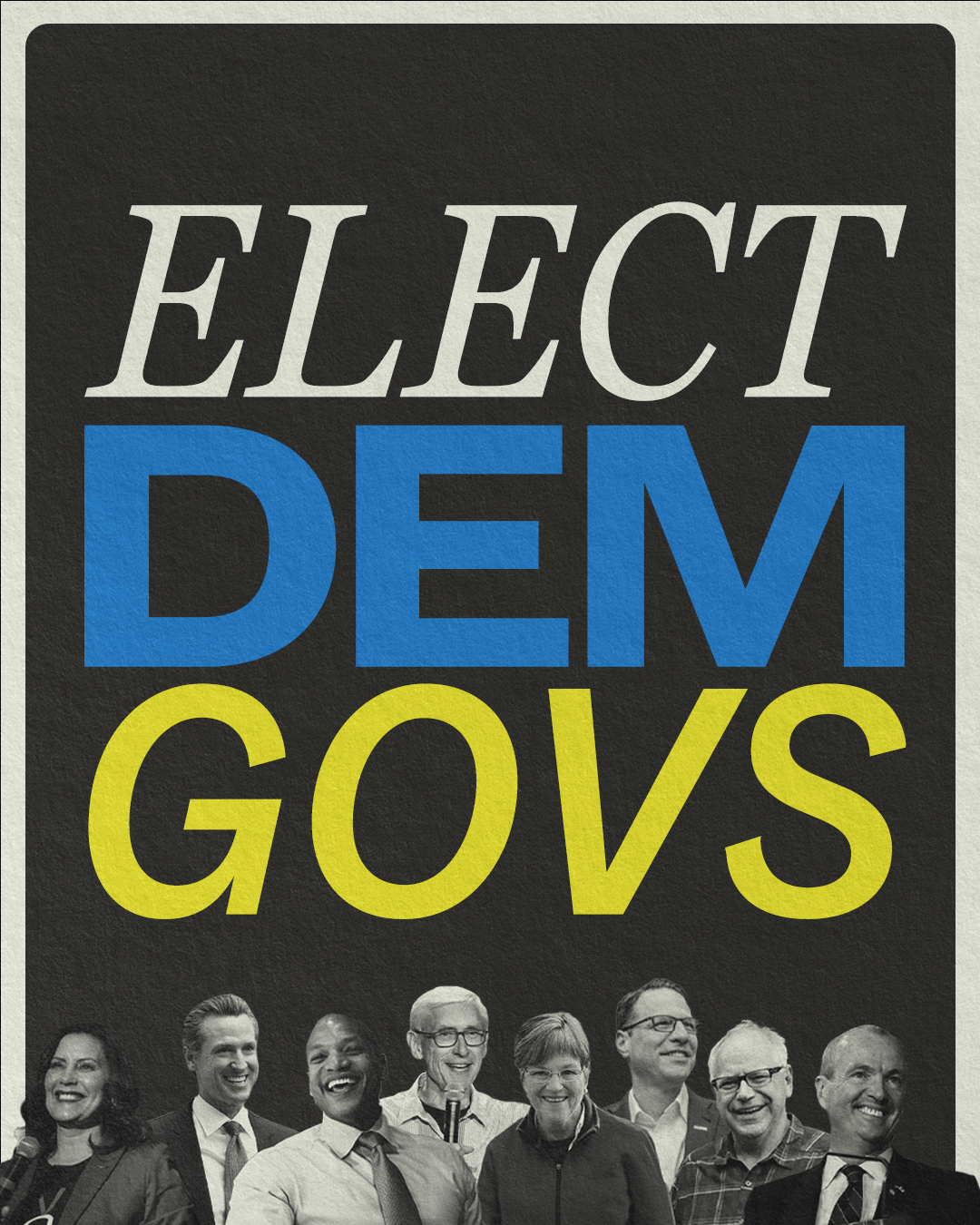USA Today Details How Democratic Governors Are Leading on Voting Rights
USA Today: State Democratic Officials “Doing All They Can to Increase Participation and Turnout”
A new USA Today article from Phillip M. Bailey highlights how Democratic governors are defending and expanding voting access as the fight to stop Republican assaults on voting rights has shifted to the states.
In Michigan, North Carolina, Pennsylvania, and Wisconsin, Democratic governors have stressed that “their veto pens are the only line of defense to protect voters.” Govs. Evers and Wolf have already taken critical action blocking Republican-backed voter suppression bills.
“There’s no question sending a message from the federal side that indeed voting is the most important act you can do to make sure we have a strong democracy in our country is needed — absolutely,” said Democratic Gov. Tony Evers of Wisconsin. “But I will tell you, in my position, I cannot wait for that to happen.”
USA Today also noted that, “Democrats leading states with divided government where Trump won have in some cases been able to do more than just play defense,” as Louisiana Gov. John Bel Edwards has signed a bipartisan bill restoring voting rights to individuals who are five years out of prison and Kentucky Gov. Andy Beshear worked across the aisle to expand early voting access. North Carolina Gov. Roy Cooper has also repeatedly blocked laws aimed at disenfranchising voters.
Oregon Gov. Brown also highlighted the DGA’s “Every State, Every Vote” campaign, which drives public attention to what stricter election laws mean and the critical role Democratic governors play in combating those efforts.
“Make no mistake about it, the election in 2022 is literally an existential fight for our democracy,” said Gov. Brown. “In the absence of congressional action, Democratic governors that have the ability to move forward are doing exactly that.”
And in two states with gubernatorial elections this year — Virginia and New Jersey — Democratic governors have received high marks for increasing access to the ballot box.
“While Republicans attack voting rights, Democratic governors are both taking the lead and serving as the last line of defense for voting rights,” said DGA Communications Director David Turner. “The leadership of Democratic governors proves the importance of electing state officials who are fighting to protect and expand Americans’ right to participate in our democracy.”
Read more on how Democratic governors are defending and expanding voting rights below:
USA Today: As action stalls in DC, Democrats look to state leaders to defend, expand voting rights
[…]
But while voting rights activists say the pressure remains in Washington, there is a need to remind state leaders to do whatever is within their power to either defend or expand voting access.
“There’s no question sending a message from the federal side that indeed voting is the most important act you can do to make sure we have a strong democracy in our country is needed — absolutely,” said Democratic Gov. Tony Evers of Wisconsin.
“But I will tell you, in my position, I cannot wait for that to happen.”
[…]
State level Democrats, meanwhile, have been very active with varying strategies depending largely on their backyards’ political landscape. Some are out of power but have joined direct-action protests and demonstrations; others have used executive authority to block restrictive laws; and others are using their legislative majorities to expand voting rights.
[…]
But Republicans also have state legislative majorities in seven states with Democratic governors — Kansas, Kentucky, Louisiana, Michigan, North Carolina, Pennsylvania and Wisconsin.
Of those states, the debate over voting rights has more importance in places President Joe Biden won.
Biden, for instance, carried Wisconsin by around 20,600 votes in 2020. Republicans there have since argued voting security measures are needed to improve election confidence. As a result, the Badger State saw a series of bills come out of its 2021 legislative session that progressive critics slammed as trying to influence future election results.
Among the proposed changes were a requirement voters fill out two forms instead of one to vote absentee; further restrictions on who can return absentee ballots; and requiring elderly and disabled voters provide IDs to vote absentee.
“Each one of those made it more difficult for somebody,” said Evers, who vetoed all six bills. “It was all about suppression, and so it was easy for me to do that.”
Evers’s office engaged in a “save the veto” campaign during Wisconsin’s legislative races last year and targeted Republican candidates in order to stiff arm a possible GOP supermajority.
Evers said that initiative was important for two reasons: It established for voters that his office was serious about blocking voter suppression measures, and it worked to give Democratic voters a powerful pen for future electoral fights.
“Now we’re in the middle of a redistricting, and I’ll be able to veto their gerrymandered maps,” Evers said. “It’s all connected.”
Democratic governors in four battleground states — Michigan, North Carolina, Pennsylvania and Wisconsin — where Republicans run the legislative branch have stressed their veto pens are the only line of defense to protect voters.
“Without federal action, the job of protecting democracy and the most fundamental right has fallen to the states, and Democratic governors are standing in the breach against Republican attacks on voting rights,” said David Turner, spokesman for the Democratic Governor’s Association.
In Pennsylvania, Gov. Tom Wolf, a Democrat, blocked a Republican proposal that would have mandated voter ID in all elections along with a host of other election-related changes. Biden won the Keystone State by about 80,500 votes last year.
“Getting my veto pen ready,” Wolf said in a June 25 tweet. “The bill passed by Republican legislators is a retaliation against Pennsylvania voters. It was pushed by the same people who begged Congress to throw out (Pennsylvania’s) votes last year. I will not allow this conspiracy theory-driven bill to silence voters.”
[…]
Ironically, Democrats leading states with divided government where Trump won have in some cases been able to do more than just play defense.
Leading up to the 2020 election, Louisiana Democratic Gov. John Bel Edwards signed a bipartisan bill allowing any individual who has been out of prison for five years to have their right to vote restored, even if they remain on parole or probation.
Trump won the Bayou State by roughly 20% after the law change.
In Kentucky, another state where Trump defeated Biden decisively, Democratic Gov. Andy Beshear signed a bipartisan bill that was passed by the GOP-dominated legislatures after the 2020 president election.
The new law expands early voting, creates ballot drop boxes in every county and allows online registration for absentee voting.
And maybe the brightest win for voting rights advocates thus far comes from another divided government state where Trump defeated Biden in 2020.
In late August, a judicial panel in North Carolina gave voting rights back to an estimated 55,000 people who had been barred due to a past felony conviction.
[…]
North Carolina Republicans, who control the legislature, have repeatedly passed laws aimed at tightening election procedures that have been blocked by Democratic Gov Roy Cooper.
[…]
If the ease or difficulty of voting is based on the state Americans live in then Democrats are doing more than playing defense where they have a legislative majority or total state government control.
The National Conference of State Legislatures shows there are 15 fully Democratic-controlled states and 18 majority-Democratic legislatures, meaning three — Maryland, Massachusetts and Vermont — where they have a GOP governor.
Democratic officials in states such as New York, Oregon and Virginia are doing all they can to increase participation and turnout ahead of next year’s mid-term races.
“Make no mistake about it the election in 2022 is literally an existential fight for our democracy,” Oregon Gov. Kate Brown … told USA TODAY.
“The future of our democracy is on the line, and frankly, our ability to conduct presidential elections depends on this election in 2022.”
For starters, the DGA has launched “Every State, Every Vote” a partnership with Fair Fight, founded by former Georgia gubernatorial candidate Stacey Abrams that has been a playbook for Democratic governors across the country.
Brown said the initiative has two thrusts: Driving public attention to what stricter election laws mean and the critical role her Democratic gubernatorial colleagues play in combating those efforts. And creating a collaborative resource for Democrats to promote best practices in their states.
“Obviously the best option is for Congress to take bold action,” she said. “But in the absence of congressional action Democratic governors that have the ability to move forward are doing exactly that.”
In Virginia, Democratic Gov. Ralph Northam signed a law in April that prohibits localities from changing the location of a polling place without getting clearance in advance or from enacting any policy that restricts access to voting based on someone’s race or language.
He also restored the voting rights of 69,000 people convicted of felonies.
New Jersey Democratic Gov. Phil Murphy earlier this year received high marks for signing legislation that increased ballot drop boxes and early in-person for more than a week.
Other Democratic governors in New York, Nevada and Washington have made similar sweeping reforms that tilt towards access, such as permanently allowing expanded vote-by-mail and automatically restoring voting rights for those who served prison time.
[…]
###


